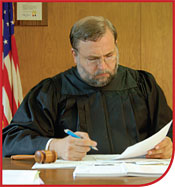
|
PLG-402
ADVANCED CIVIL LITIGATION
3 Credits
|
This course is a part of:
Certificate Program
Associate's Degree Program
Bachelor's Degree Program
Required Prerequisites:
PLG-108: Legal Research, Writing and Civil Litigation
PLG-101: Torts and Personal Injury
This course is designed specifically to prepare a student to handle all aspects of a civil case. The course looks at the trial process from start to finish and examines the paralegal’s role and the rules that the paralegal must follow in fulfilling that role. The course looks carefully at all of the steps in a civil case, commencing with the initial client interview and following the civil litigation process through the initial investigation, drafting and filing of the complaint, the discovery process, preparing for trial, assisting during trial and finishes with a look at the paralegal’s role in the appeals process. Special attention is paid to pleadings and motions and to preparing and filing discovery requests and responses.
Course Learning Outcomes
At the completion of this course, the student will be able to:
- Describe the court systems as they exist on the federal level and in most states
- Determine which paralegal tasks should be billed as “legal work” to clients
- Prepare for and conduct an initial client interview in a civil litigation process
- Determine which types of evidence will be admissible at trial
- Help plan an investigation into an incident relevant to a civil litigation
- Properly preserve evidence for use at trial
- Draft pleadings (e.g., complaint and answer) that are filed at the outset of a civil case
- File a complaint and arrange to have it properly served on the defendant
- Determine the manner in which to obtain a default judgment in the student’s jurisdiction
- Draft a motion for relief from a court during a civil litigation proceeding
- Help put together a discovery plan for investigating relevant information by using appropriate discovery devices
- Draft interrogatories and requests for production and notices of deposition
- Create digests of depositions and other discovery responses and extract the relevant information
- Describe the main methods of alternative dispute resolution
- Help draft a settlement proposal and help determine whether a settlement proposal from the opposing party protects a client’s interests
- Assist with jury investigation and jury selection
- Help attorneys throughout the trial process by keeping a trial notebook, tending to witness’ needs, etc.
- Prepare a judgment, bill of costs and other important post-trial documents
- Assist with the preparation of appellate briefs, including the preparation of a table of authorities, statement of issue, etc.